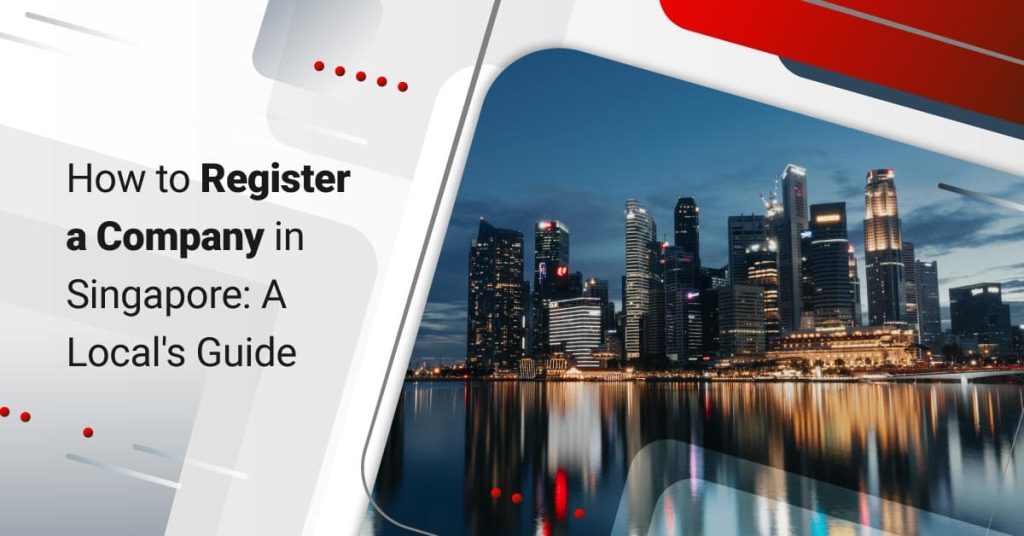
Singapore is a thriving hub for entrepreneurs and businesses known for its ease of setting up, favorable business environment, strategic location, and well-developed infrastructure.
The vibrant city-state attracts both local and foreign investors who are looking to establish their own businesses.
If you are considering setting up a company in Singapore, here is a guide to help you through the process.
Why Should You Set Up a Business in Singapore?
Singapore is a great place to set up a business because of its political stability and open economy. It also has one of the lowest corporate tax rates in the world, making it an attractive option.
The country also offers many incentives to foreign investors, including grants, tax incentives, and support for research and development (R&D) activities.
In addition, Singapore has a highly educated workforce with world-class infrastructure making it perfect for businesses ranging from small startups to large multinational companies.
How to Register a Company in Singapore

Setting up a business in Singapore is relatively simple, but there are still key decisions to make and things to note before you can do so. We detail the process below:
Choose Your Business Entity
The first step in setting up a company in Singapore is to determine the business entity that best suits your needs. There are several business entities to choose from in Singapore, including:
Private Limited Company (Pte Ltd)
A private limited company is the most popular choice in Singapore for good reason. It has a flexible ownership structure of up to 50 shareholders which can comprise individuals, companies, or a mix of both.
Since it is also a limited liability company, even if the business winds up, the shareholders only lose their initial share capital invested into the company. They can protect their personal assets in this way.
The company also has a separate legal identity from its owners, which means that it can own real estate and assets in its own name. Instead of its owners, it is responsible for paying property tax from its own assets.
Even if any of its owners leave the company, it still enjoys business continuity in the form of perpetual succession until it winds up.
Considering its many benefits, it is not surprising why most entrepreneurs and business owners go for this option.
Related Read: Setting Up a Limited Company by Guarantee? Read This Guide »
Partnership
A partnership is a group of at least 2 individuals. If a partnership has more than 20 partners, it must incorporate as a company under Chapter 50 of the Singapore Companies Act.
Each business structure has its own advantages and disadvantages, and it is essential to choose the one that best suits your business needs.
It is not a separate legal entity from the partners, who also have unlimited liability. The partners are personally liable for the partnership’s debts and losses caused by other partners.
Limited Partnership (LP)
An LP involves a partnership of at least 2 individuals, where there is at least 1 general partner and 1 limited partner. Unlike a private limited company, it is not a separate legal entity from its owners.
General partners have unlimited liability, which means that they are personally responsible for the company’s debts and obligations.
Continuity is subject to whether there is a limited partner – if there is none, the LP registration is suspended and will only be restored to a “live” status after a new limited partner is chosen.
Limited Liability Partnership (LLP)
Like an LP, an LLP involves at least 2 partners – however, it has limited liability and is a separate legal entity from the partners.
It can sue or be sued in its name and can also own property like a private limited company. The partners are personally responsible for debts due to their own erroneous actions, but not if it is incurred by other partners.
It may be suitable for those who prefer not to go through the hassle of statutory requirements for annual general meetings (AGMs), directors, company secretaries, and share allotment.
However, the fact that partners may have to personally pay off debts and losses will be a key disadvantage to consider.
Sole Proprietorship
As its name suggests a sole proprietorship is a business owned by 1 person. It is not a separate legal entity from its owner, who also has unlimited liability.
The owner is personally liable for all debts and losses incurred by the business, which may be one reason why this is usually the least popular choice among business owners.
If the owner passes on or does not wish to continue the business, the business automatically ceases to exist.
Register Your Business With the Accounting and Corporate Regulatory Authority (ACRA)
Once you have determined your business structure, the next step is to register your business with ACRA in Singapore.
This can be done online via the BizFile+ portal, or by engaging the services of a professional services firm to handle the registration process for you.
During the registration process, you must provide the following information:
- Proposed business name, which must be approved before registration, and which will be reserved for 4 months after approval
- SSIC code corresponding to your intended business activity
- Personal particulars of shareholders and directors
- Company constitution
- Registered office address, which must be a physical office address located in Singapore. P.O. boxes are not accepted
Use our free company name check tool before you submit your business name application to determine if your desired name is available!
You must also comply with these requirements before you can set up your business in Singapore:
- Have at least 1 company director, of at least 18 years of age, and is a Singapore citizen, Singapore Permanent Resident (PR), or EntrePass holder
- Have at least 1 locally resident director
- Have at least 1 shareholder who is either an individual or a legal entity
- Provide paid-up capital of at least S$1
Certificate of Incorporation
After payment of the necessary registration fees and the successful registration of your business, ACRA will issue a Certificate of Incorporation, which signifies that your business is now a legal entity.
This Certificate of Incorporation comes in the form of an email notification with your company registration number. If you want a hard copy, you can request it online from ACRA at S$50 per copy.
Unique Entity Number (UEN)
After your business is registered, you will also get a UEN. This is your company’s unique identification number used to transact with government agencies.
Free Business Profile
Newly registered businesses in Singapore can obtain a free business profile via a download link. This profile is an electronic report that has details about your business.
It can be used for background checks by potential business partners, suppliers, and clients.
How Much Does it Cost to Register a Business in Singapore?
These are the fees associated with registering a business in Singapore with ACRA:
| Fee Type | Cost |
| Business Name Application | S$15 (subject to additional fees beyond the initial 120 days that the name is reserved for) |
| Company Registration | S$300 |
| Sole Proprietorship Registration | S$100 |
| Partnership Registration | |
| LLP Registration | |
| LP Registration | S$100 (1 year) S$160 (3 years) |
Note that if you engage a corporate service provider, the fees will vary depending on the type of service you choose.
How Long Does it Take to Register a Singapore Company?
When it comes to the processing time for Singapore company registration, it usually takes up to a day or a few days for the entire setup to be complete, including the name application.
However, if your name application or company registration requires additional approval or must be referred to another agency, it may take 14 to 60 days instead.
Things to Do After Incorporating Your Singapore Company
There are several things you should consider doing after you register your company in Singapore, such as opening a corporate bank account, getting your business licence, and more.
Here are some of them:
Open a Company Bank Account
Businesses in Singapore are advised to open a business bank account after incorporation. It can be used for these purposes:
- Separate your business and personal transactions
- Help to track business cash flows, income, and expense transactions, which will help when filing your income tax returns
Corporate Bank Account Requirements
Most Singapore banks have these requirements prior to account opening:
- At the time of opening your company bank account, the majority directors and account signatories must be at the paperwork signing in person in Singapore
- You must also provide these supporting documents:
| Finished Corporate Account Opening Forms | Must be signed by authorised signatories per the board resolution |
| Board of Directors Resolution | Endorses the opening of the bank account and the account signatories, which should be prepared by the company secretary |
| Certified True Copy of Resolution | Authenticates the opening of the bank account and the account signatories. Most banks in Singapore have their own format and only require your signature |
| Certified True Copy of Certificate of Incorporation | The company secretary or 1 company director must certify this |
| Certified True Copy of Company’s Business Profile from ACRA | The company secretary or 1 company director must certify this |
| Certified True Copy of Company’s Constitution | The company secretary or 1 company director must certify this |
| Certified True Copies of Passport/Singapore IC and Proof of Residential Address of the Directors, Signatories, and Ultimate Beneficiary Owners | Simply bring the original copies if you are in Singapore so that the bank can make a copy |
You can choose to open a corporate bank account with any of these options:
- Traditional bank (DBS, UOB, OCBC)
- Digital bank (ANEXT, Green Link Digital Bank, GXS)
- Neobank (Aspire, Wise, Revolut)
Get Business Insurance
Protect your business with the key insurance coverage it needs. Some types of business insurance you can consider include:
- Public liability insurance
- Employee insurance
- Commercial vehicle insurance
- Business travel insurance
Related Read: 13 Types of Insurance a Business Needs »
Obtain Necessary Business Licenses and Permits
Depending on the nature of your business, you may need to obtain certain licenses and permits from the relevant government agencies.
For example, if you’re in the food and beverage industry, you must obtain a food shop license from the National Environment Agency (NEA).
Some of the different licenses and permits that you may require include:
- Trade license
- Food shop license
- Liquor license
- Employment agency license
- Money-lender’s license
- Import and export licenses
The requirements for obtaining these licenses and permits vary depending on your business activities, and it is essential to check with the relevant authorities to ensure that you have all the necessary licenses and permits.
You can apply for and manage your business licence on the GoBusiness Licensing portal.
Get a Commercial Space
Every business has different commercial space needs depending on its nature. For example, an F&B business may require a restaurant shop space, and an apparel business may need a retail shop space.
Whichever it is that you need, you should find out about the activities that you can and cannot do with the commercial space you are renting or buying.
Businesses can use e-Advisor on GoBusiness Singapore to find out more.
Related Read: What’s Trending in the Singapore Commercial Property Space in 2023? »
Hire Key Personnel and Employees
Every business in Singapore must appoint a company auditor within 3 months of registration unless exempted.
They must also hire at least 1 company secretary within 6 months of incorporation. If the position is left empty for over 6 months, directors may have a penalty of up to S$1,000.
If you plan to hire employees for your business, you need to register your business with the Central Provident Fund (CPF) Board and obtain a work pass for each foreign worker that you hire.
The work pass is issued by the Ministry of Manpower (MOM) and is mandatory for all foreign workers in Singapore.
Some examples of work passes in Singapore are:
- Employment Pass (EP)
- S Pass
- Overseas Networks and Expertise (ONE) Pass
Register for Corppass
Corppass is a digital identity for businesses in Singapore to engage with government agencies online.
You can visit the Corppass site after incorporation to set it up, manage it, and give selected employees access to it. These chosen employees can use their personal Singpass accounts and log in to BizFile+ to transact with ACRA.
Register for Goods and Services Tax (GST)
Most of the time, it is mandatory for a company to register for GST if they meet these terms:
- Have a yearly turnover of over S$1 million for a perpetual period of 12 months
- The person managing the business reasonably expects the turnover to exceed S$1 million for the next 12 months
Companies can register for GST with the Inland Revenue Authority of Singapore (IRAS) through BizFile+.
Manage Your Intellectual Property (IP)
It is necessary to protect your business’ IP and intangible assets. Some forms of protection include trademark registration, patents, and designs.
A robust IP portfolio can provide business opportunities in the form of partnerships, franchising, licensing, and more to monetise your IP value.
Related Read: Guide to Global Trademark Registration »
Apply for Business Grants
There are various corporate grants and schemes the Singapore government has for new and existing businesses. Some of these grants you can apply for to get financial support include:
- Startup SG Founder
- Startup SG Tech
- Productivity Solutions Grant (PSG)
- Market Readiness Assistance (MRA) Grant
- Enterprise Development Grant (EDG)
InCorp is Here to Help You Register Your Company in Singapore
Setting up a company in Singapore is a streamlined and straightforward process, but it can be challenging if you’re unfamiliar with the regulations and requirements.
It is highly recommended that you engage a professional services firm that can guide you through the process and ensure that all the necessary steps are taken.
With the right guidance, the process of setting up a company in Singapore can be a smooth and successful one.
Contact our team
Posts not found!
FAQs
How do you register your company in Singapore?
Registering your company in Singapore comprises a few basic steps:
- Choosing your business structure
- Registering it with ACRA
Apart from doing it yourself, you can also enlist the help of a registered filing agent such as InCorp to ensure a smooth and successful experience!
How easy is it to register a company in Singapore?
- Singapore is ranked first on the ease of doing business in the world for good reason. It is relatively easy to set up a business in Singapore and quick as well.
How long does it take to register a company in Singapore?
- The company incorporation process usually takes up to one day if there are no additional approvals or referrals required.
What is the Corppass in Singapore?
- Corppass is a digital identification for Singapore-registered firms that provides secure access to online government e-services. It acts as a single authentication and authorisation system for businesses to transact with multiple government agencies in Singapore.


